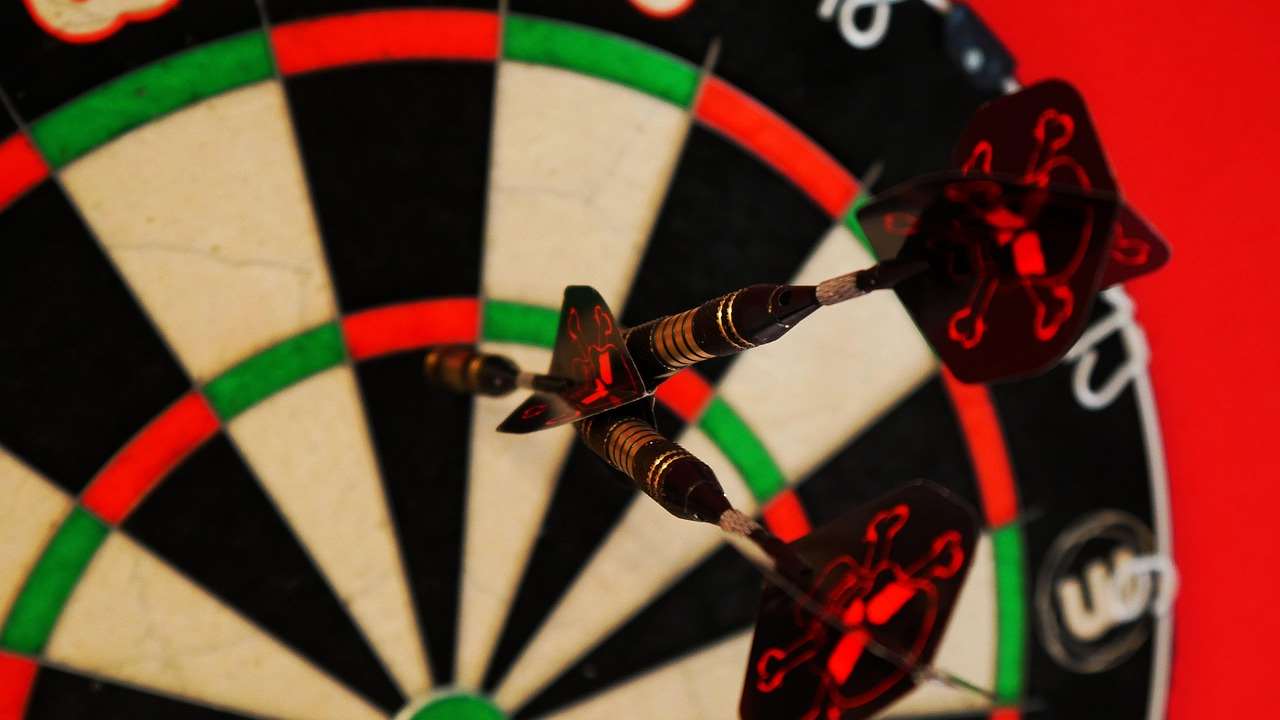Tired of starting every darts game at 501 or 301? The beauty of darts lies in its adaptability, and exploring different start scores darts game options injects fresh excitement and strategic depth. This article dives into a variety of alternative starting points, explaining their rules, benefits, and how they can transform your darts experience, catering to all skill levels and preferences.
⚠️ Still Using Pen & Paper (or a Chalkboard)?! ⚠️
Step into the future! The Dart Counter App handles all the scoring, suggests checkouts, and tracks your stats automatically. It's easier than you think!
Try the Smart Dart Counter App FREE!Ready for an upgrade? Click above!
Exploring Different Start Scores in Darts Games
While 501 and 301 are the cornerstones of darts, limiting yourself to these numbers means missing out on a vast landscape of strategic possibilities. Using different start scores in darts game play can significantly alter the dynamics, demanding new approaches to scoring, checkout strategies, and overall gameplay. Let’s explore some popular and less common alternatives to the standard starting numbers.

Why Consider Different Starting Scores?
- Variety and Excitement: Breaking free from the norm keeps things fresh and prevents monotony.
- Skill Development: Adapting to new starting scores forces you to refine your calculations and develop a more versatile scoring game.
- Handicapping: Adjusting the starting score is an excellent way to level the playing field in games between players of varying skill levels. This is also talked about when Handicap system fun dart games is in question.
- Shorter Games: Lower starting scores, like 101 or 201, are ideal for quick matches when time is limited.
- Targeted Practice: Some starting scores encourage specific scoring techniques or checkout combinations.
Popular Alternatives to 501 and 301
Beyond the standard options, numerous other starting scores offer unique challenges and opportunities. These alternatives are often used in casual games or as variations within leagues.
101: The Speedy Showdown
Starting at 101 creates a fast-paced and exciting game. It’s perfect for beginners or when you want a quick match. Checkout strategies become paramount, as there’s little room for error.
201: A Balanced Challenge
201 offers a good balance between speed and strategy. It allows for more scoring combinations than 101 but still requires efficient checkout planning.
401: A Strategic Variant
Starting at 401 introduces an interesting twist. It necessitates a more deliberate approach to scoring, as players must carefully manage their remaining points to set up optimal checkout opportunities.
Unconventional Starting Scores: Adding a Twist
For those seeking a truly unique experience, consider these unconventional starting scores. These often come with modified rules or scoring systems.
Cricket Scoring in a Points Game
While Cricket is traditionally a game of opening and closing numbers, you can adapt it by assigning point values to the numbers you hit. A starting score of, say, 200 points requires you to accumulate the most points by hitting the Cricket numbers (20, 19, 18, 17, 16, 15, and Bull) and closing them before your opponent. This can be seen in Darts Variants Fun Games.
Around the Clock (with a Twist)
Start with a set score, and players must hit each number in sequence (1 to 20) to reduce their score to zero. Add an extra layer of complexity by requiring doubles or triples to advance to the next number.

Halve It
In this game, players start with a predetermined score, such as 301. Each round, they must hit specific targets (e.g., all even numbers, all odd numbers, all trebles) to avoid having their score halved. This requires precision and adaptability.
Adapting the Rules for Different Start Scores
When experimenting with different start scores darts game variations, consider adjusting the standard rules to enhance the gameplay experience.
Double In/Out
Requiring a double to start (“double in”) adds an extra layer of difficulty, particularly with lower starting scores. Similarly, mandating a double to finish (“double out”) is a standard rule, but you can also experiment with requiring a specific double (e.g., double 20) for an added challenge.
Master Out (Double or Treble)
Instead of just requiring a double to finish, introduce the “master out” rule, which requires either a double or a treble to win the game. This increases the level of precision required and encourages players to aim for higher-scoring targets.
Specific Checkout Combinations
To further refine the game, impose restrictions on checkout combinations. For instance, players might be required to use at least one treble in their final three darts or avoid using a bullseye in the checkout. Also relevant to this is to understand that you may need to consider Adjusting dart game rules.
Strategic Considerations When Using Different Start Scores
Choosing a different start scores darts game option requires strategic thinking. The optimal approach varies depending on the starting score and the skill level of the players.
Early Game Scoring
With higher starting scores (e.g., 601 or 701), focus on consistent scoring to reduce your score quickly. Aim for the treble 20 or other high-scoring targets.
Mid-Game Positioning
As you approach the checkout range, prioritize positioning your score for favorable checkout combinations. Avoid leaving yourself with awkward numbers that are difficult to finish.
Checkout Planning
Careful checkout planning is crucial, regardless of the starting score. Analyze your remaining score and identify the most efficient and reliable checkout path.

Handicapping with Different Start Scores
One of the most effective ways to use different start scores darts game options is for handicapping. This allows players of varying skill levels to compete on a more even playing field.
Adjusting the Starting Score
The simplest method is to give the less skilled player a lower starting score. For example, if one player is significantly better than the other, they might start at 501, while the other player starts at 301 or even 201.
Adding Points to the Opponent
Instead of reducing the weaker player’s starting score, you can add points to the stronger player’s score. This achieves the same effect of leveling the playing field.
Using Different Checkout Requirements
Another handicapping technique is to impose more stringent checkout requirements on the stronger player. For instance, they might be required to finish with a double or treble, while the weaker player can finish with any number.
Tips for Implementing Different Start Scores in Your Games
To seamlessly integrate different start scores darts game variations into your darts sessions, consider these tips.
Communicate Clearly
Before starting a game with a different starting score or modified rules, ensure that all players understand the new parameters. Clear communication prevents confusion and ensures fair play.
Experiment and Adapt
Don’t be afraid to experiment with different starting scores and rule variations to find what works best for your group. Adapt the rules as needed to create a fun and challenging experience for everyone. Consider how you might be Adapting darts games skills.
Keep Track of Scores
Use a whiteboard, scorecard, or darts scoring app to keep track of scores accurately. This is especially important when using unconventional starting scores or complex scoring systems.

The Psychological Impact of Different Start Scores
The starting score can significantly affect a player’s mindset and strategy. Lower starting scores can create a sense of urgency, while higher scores encourage a more deliberate approach.
Confidence and Momentum
Starting with a higher score can give players a boost in confidence, as they have more room for error. Conversely, a lower starting score can create a sense of pressure to perform well from the outset.
Risk Assessment
The starting score can influence a player’s risk assessment. With a higher score, players might be more willing to take risks on high-scoring targets. With a lower score, they might adopt a more conservative approach.
Mental Toughness
Adapting to different starting scores requires mental toughness. Players must be able to adjust their strategies and maintain their focus, regardless of the score.
Different Start Scores Darts Game: Enhancing the Social Aspect
Playing with different start scores darts game options can enhance the social aspect of darts by promoting inclusivity and creating a more enjoyable experience for players of all skill levels.
Leveling the Playing Field
Handicapping with different starting scores allows players of varying abilities to compete on a more even playing field, fostering a sense of camaraderie and friendly competition.
Creating Shared Experiences
Experimenting with new starting scores and rule variations creates shared experiences that can strengthen bonds between players. It’s also important to focus on Making darts games fair players.
Promoting Inclusivity
By adapting the game to suit the needs of all players, you create a more inclusive environment where everyone feels welcome and valued.

Conclusion: Embrace the Variety of Different Start Scores Darts Game
Exploring different start scores darts game options opens up a world of possibilities, adding variety, excitement, and strategic depth to your darts experience. Whether you’re looking to handicap games, create new challenges, or simply break free from the norm, experimenting with alternative starting points can transform your game. So, grab your darts, gather your friends, and embrace the endless possibilities that await!
Ready to elevate your darts game? Experiment with different start scores, adapt the rules, and discover the hidden depths of this timeless sport. Share your favorite variations with us in the comments below!
Hi, I’m Dieter, and I created Dartcounter (Dartcounterapp.com). My motivation wasn’t being a darts expert – quite the opposite! When I first started playing, I loved the game but found keeping accurate scores and tracking stats difficult and distracting.
I figured I couldn’t be the only one struggling with this. So, I decided to build a solution: an easy-to-use application that everyone, no matter their experience level, could use to manage scoring effortlessly.
My goal for Dartcounter was simple: let the app handle the numbers – the scoring, the averages, the stats, even checkout suggestions – so players could focus purely on their throw and enjoying the game. It began as a way to solve my own beginner’s problem, and I’m thrilled it has grown into a helpful tool for the wider darts community.